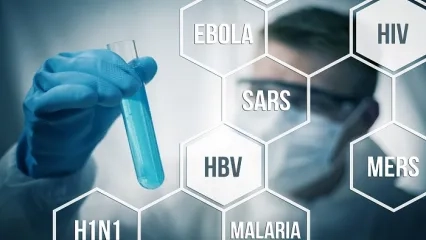Alo Yeditepe
Alo Yeditepe
The Way to Fight AIDS is to Raise Awareness First
According to statistics, 36.9 million people around the world continue to live with HIV infection. Stating that 36 million people have lost their lives since the beginning of the epidemic, Yeditepe University Koşuyolu Hospital Infectious Diseases and Clinical Microbiology Specialist Prof. Dr. Meral Sönmezoğlu remarks that the number of new HIV infections spreading rapidly in all countries of the world started to decrease with the introduction of effective drugs in 1996. The loss of life rate began to decline after 2004.
AIDS, which is defined as acquired immunodeficiency syndrome, continues to be important even though 37 years have passed since the disease was identified. The disease-causing HIV weakens the body's defenses, leading to infections in immunocompromised patients that result in the death of even simple germs that cannot cause disease in healthy people. It is extremely important to increase social awareness in order to provide early diagnosis and protection. Yeditepe University Koşuyolu Hospital Infectious Diseases and Clinical Microbiology Specialist Prof. Dr. Meral Sönmezoğlu says that the HIV epidemic in developed countries can be controlled by identifying risk groups, providing disease prevention training to these groups, ensuring that they are tested and starting treatment for all newly diagnosed patients. Along with this, Dr. Sönmezoğlu explains that the rate of loss of life of patients is reduced, the number of new patients can be reduced and the quality of life of living patients can be increased. In contrast, the number of new patients continues to increase in Eastern Europe and Central Asian countries.
In the 2000s, only 2 percent of patients were able to access combined HIV treatments that effectively suppress the HIV and restore the immune system, compared to 12 percent in 2007 and 59 percent in 2017.
There Has Been A Significant Increase in the Last Ten Years
Drawing attention to the fact that the number of HIV-positive / AIDS patients in Turkey has increased inversely despite the decrease in the world, Prof. Dr. Meral Sönmezoğlu gives the following information: “The first HIV case in our country was diagnosed in 1985. While a total of 3 cases were recorded in the same year, the annual number of patients reached 100 after 1996 and 1000 after 2012. Only 2573 new patients were diagnosed in 2016 and 2965 people were diagnosed in 2017.
The rapid increase in the number of HIV-infected patients in our country can be explained by the late decision of existing patients to take tests, as well as the low level of awareness about HIV infection in our society and the knowledge about transmission methods and prevention methods. According to the December 2017 data of the Ministry of Health of the Republic of Turkey, there are 17,884 registered HIV-positive/AIDS patients in Turkey. It is estimated that the number of registered patients is about 40 percent of the total number of patients thought to exist, and the actual number of cases is about 30,000.”
Our Country's AIDS Statistics
- Of the registered cases, 80 percent are men and 20 percent are women.
- 79.2% of the cases are men and 20.8% are women.
- 15.2% of the patients are foreign nationals.
- It is highest in the 30-34 and 25-29 age range.
- Looking at the transmission route, it is reported that 49.8 percent of the cases are sexually transmitted, and 71.9 percent of these cases are heterosexual sexual intercourse.
- The transmission route of 1.4 percent of the cases is intravenous substance use, and the transmission route of 47.8 percent is unknown.
Awareness Must be Raised!
Patients detected in developed countries are thought to be 80 percent of what exists in society. In less developed countries, this rate is around 20-25%, and in European countries it is around 50%.
Emphasizing that sexually active young adults are at primary risk for contracting the disease in our country, Prof. Dr. Meral Sönmezoğlu underlines that the level of knowledge about the ways and measures of transmission of the disease should be increased. Prof. Dr. Sonmezoglu gives the following information:
“When a person receives the virus through unprotected sexual contact, they can still infect many people through unprotected sex, as they can live for an average of 8-10 years without any signs of disease. The low number of institutions providing counseling on sexually transmitted infections, the lack of sufficient applications to health institutions, the insufficient registration systems, and the lack of institutions where suspects can be tested for free may be the reasons for the rapid spread of HIV in the society."
In order to protect against HIV/AIDS...
Prof. Dr. Meral Sönmezoğlu lists her suggestions by stating that December 1, World AIDS Day, is a day chosen for countries to evaluate their place in the HIV epidemic, to evaluate awareness in society and to give up-to-date messages:
- Every age group in the society, especially the 18-45 age group, must be trained on HIV infection.
- Especially the young adult age group should be warned to avoid unprotected sexual contact.
- Pregnant women with other sexually transmitted diseases and tuberculosis should be tested for HIV.
- It should be emphasized that HIV is found in blood and genital secretions in the body, it cannot be passed through skin contacts such as shaking hands in social life, and it is wrong to remove HIV (+) people from social environments.
- Society's view and perception of HIV infection should be changed, and it should be informed that HIV infection is not a fatal disease and that there is effective treatment.
- Groups at risk for HIV transmission should be trained and those within these groups should be supported to get tested.
- Risk groups in our country should be announced. (Unprotected sexual contact, male homosexuals, sex workers, intravenous drug users)
- The fact that HIV (+) people start treatment as soon as possible has positive effects on the immune system and life span. Patients should be supported in starting and continuing treatment.
- Patients' right to privacy of information and protection of their social lives should be respected.
- HIV testing should be done and early treatment information should be disseminated
About
Faculty and Year of Graduation:
Medical Faculty of Ankara University, 1984
”
See Also
- Infections Common in Hot Weather
- What is Hepatitis B? What are its symptoms? How is it Transmitted?
- What is HMPV Virus? HMPV Symptoms and Ways of Transmission
- Why Is the Flu Lasting Longer This Year?
- What is West Nile Virus? What are the Symptoms and how is it Transmitted?
- Viral Hepatitis and Prevention Methods
- What Precautions Should Be Taken Against the Cold Epidemic?
- Don't Be Late Fighting Against Diseases
- Antibiotics Kill Beneficial Bacteria, Not Viruses
- What is Hepatitis? What are the Symptoms and Treatment Methods?
- Symptoms and Treatment of Tick Bites
- Summer Infections
- Precautions Must Be Taken Against Loss of Life Due To Infection in Thalassemia
- Information on H1N1 (Swine Flu)
- Summer is Coming... Beware of food poisoning!
- Office Hygiene: The Most Common Areas Where Microbes are Found in the Office
- Our Taboos Affect the Increase in the Number of HIV-Positive Cases in Turkey
- Strep A Symptoms and Treatment
- Do Not Put a Cigarette Butt or Pour Olive Oil or Liquid Soap on the Tick
- Reheat the Food You Cooked Only Once!
- HIV Can Be Hidden for 10 Years without Any Symptoms!
- 290 Million People Live Without Knowing They Have Hepatitis
- Things to Consider When Touching Meat at Eid
- What Is Anthrax Disease?
- Still Not Too Late For Flu Vaccine
- What is Rhinovirus?
- Fighting with Thalassemia: Meral Yılmaz
- Thalassemia Spreads from the Mediterranean to the Whole of Europe with Migration!
- Early Treatment of Crimean Congo Hemorrhagic Fever is Vital
- Approximately 3 Million Patients Need Blood Transfusions Every Year in Turkey
- When to Get the Flu Vaccine
- Antibiotics Account For 14% of Prescription Costs
- West Nile Virus Replaces Malaria
- It Is Necessary to Try to Be Healthy in order to Be Protected
- A New Flu Outbreak is Expected Every 10 Years
- 63% of Vector-Borne Diseases are Caused by Lyme Disease
- Experts Warn About Flu Risk
- Mosquito Infection Risk
- Why aren’t Antibiotics Working Any More?
- The World Raises an “Alarm” on Antibiotic Resistance!
- What is COVID-19?
- The Mask Requirement was Removed and the Importance of Social Distance Increased!
- How to Prevent COVID-19 in School-Going Children
- WHO (World Health Organization) Warns for Antibiotic Resistance!
- Who Is Threatened by Monkeypox?
- Ways to Prevent Coronavirus
- Swine Flu / H1N1
- Life Returns to Normal with Caution
- What is Monkeypox Virus? What Are the Symptoms of the Monkeypox Virus?
- What is Lyme Disease?
- How to Tell if You Have a Mild Coronavirus?
- Pay Attention to These Rules for COVID-19
- Hand Sanitizer Usage Guide
- The Priority Rule for the Protection from Summer Infections is Hygiene
Alo Yeditepe





